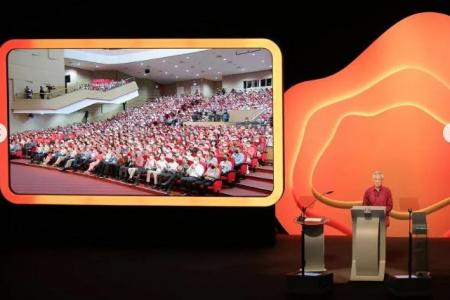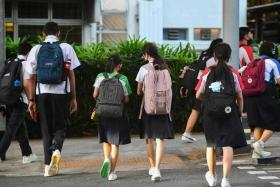NDR 2022: Strong, resilient Malay/Muslim community makes for stronger Singapore
A strong and resilient Malay/Muslim community makes for a stronger and more resilient Singapore, as it navigates an increasingly uncertain and complex world.
Prime Minister Lee Hsien Loong noted that the community has forged a distinctive and confident Singaporean Malay/Muslim identity, which has integrated deeply into the Republic's multiracial society.
Speaking in Malay during his National Day Rally speech on Sunday (Aug 21), he said: "The contributions of the Malay/Muslim community during the pandemic are testament to our society's progress and success, reflecting how integrated we all are in Singapore's multiracial multi-religious society."
He noted the steady progress the community has made on socio-economic issues over the decades, and lauded the strong network of community organisations committed to the development of the Malay community.
Mr Lee described the self-help group Mendaki as a "prime example of how the community comes together to help one another", adding that a number of individuals who have done well are contributing back to the community.
He said Mendaki, which is marking its 40th anniversary in October, had since its inception helped the community focus on education as the key to socio-economic progress.
The group's efforts have paid off.
Over the last decade, almost 500 people received the Mendaki Excellence awards, which are given to those who attained degrees with first class honours, said Mr Lee, adding that only a handful of the awards were given in Mendaki's first 10 years.
"The results of Mendaki's effort speak for themselves," he said.
"Better academic performance has led to better jobs with more Malay/Muslims in professional roles, higher incomes, and having better lives," he added.
Mr Lee said the success and self-confidence of a community depends not only on its socio-economic progress, but also intangible cultural and spiritual factors.
"In this journey, the Malay/Muslim community has benefited from strong religious leadership," he said.
Practical guidance by the Islamic Religious Council of Singapore (Muis) and asatizah (religious teachers) here have helped the community adapt its religious practices to Singapore's "constantly changing and complex circumstances".
He said this includes adjusting Friday prayer arrangements and deferring the Haj pilgrimage for two years in a row because of Covid-19, which helped keep pilgrims safe.
Mr Lee also pointed to the contributions of the Religious Rehabilitation Group (RRG), which had worked to rehabilitate radicalised individuals and guide the community on the correct interpretation and practice of Islam.
"They not only protected our Muslim community from extremist ideologies, but helped to maintain trust and confidence towards our multiracial, multi-religious society," he added.
Mr Lee thanked the asatizah who had served in the RRG - which will be marking its 20th anniversary next year - singling out co-chairmen Ustaz Hasbi Hassan and Ustaz Ali Mohamed for showing "strong leadership, courage, and commitment".
Ustaz Ali will be retiring as the RRG's co-chair at the end of this month and will serve as the group's Emeritus President, he said.
Mr Lee noted that as a multiracial society, Singapore needs to deal with sensitive issues in a way that preserves society's racial and religious harmony.
He said the decision to allow Muslim nurses in public hospitals to wear the headscarf with their uniforms was years in the making.
It took a lot of quiet engagement, dialogue, preparation, and understanding from all parties, and not just the Malay/Muslim community, added Mr Lee.
The announcement was made in August last year.
The prime minister said that from time to time, there will be other sensitive issues but they must be addressed in the same manner.
"This requires mutual understanding across all groups, and the willingness to give-and-take and work together.
"Only then can every group have the space to maintain its religious and cultural practices, and get on harmoniously together," said Mr Lee.
Get The New Paper on your phone with the free TNP app. Download from the Apple App Store or Google Play Store now


